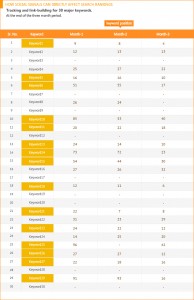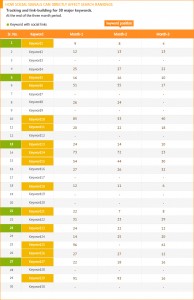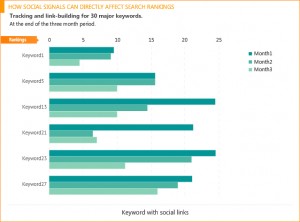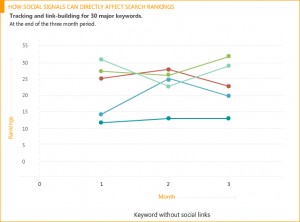How Social Signals Can Directly Affect Search Rankings
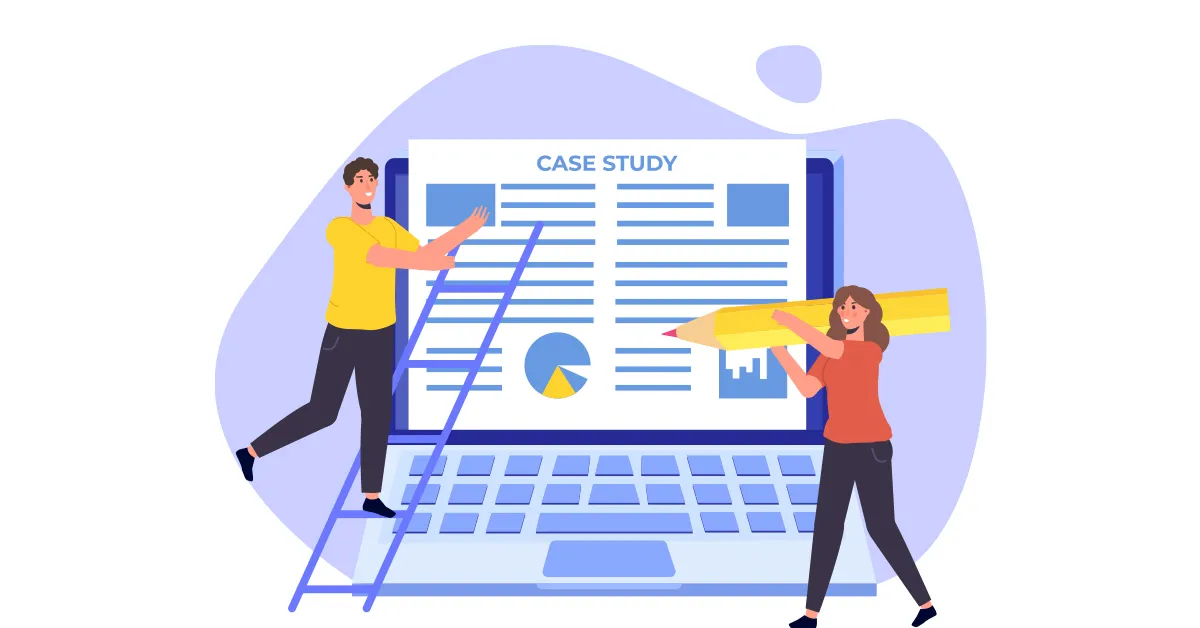
As search marketers we are often asked to reveal our “secret sauce” or industry secrets. Sometimes, clients may want definite answers to questions that aren’t so black and white. If we knew the exact search algorithms, by all means, we would have all of our clients ranking #1….for everything.
Since many valuable best practices are discovered internally, we rely on the next best thing… case studies.
Recently, I took a sample size of 4 months of content syndication for a particular client. This client had seen some solid gains in rankings during this period, and we wanted to take a very granular approach and get an accurate idea of what was really driving these results.
We were tracking and link-building for 30 major keywords. At the end of the three month period, we highlighted all the keywords that we considered to have made substantial gains in search rankings. See the highlighted keywords below that were selected due to gains in rankings (the columns to the right show the keyword position):
We then took a look at the links we acquired for these keywords. We listed the links, their Page Rank and Domain Authority, as well as the keywords that were used in the anchor text. We then highlighted the same keywords that were identified in the previous step. When sorting by PR and DA, we noticed that there was no direct correlation between the authority of the sites and the keywords that were most successfully moving the needle. We are not saying that these aren’t important factors, as the whole content syndication was likely contributing, and this was only a three month period; however, we wanted to find a more clear indication.
During this period we acquired various Facebook likes, Google +1’s and Tweets for a percentage of the article links. In order to test out the effectiveness of acquiring these social signals, we only accumulated them for half of the keywords we were going after so we could see if the social signals were adding any benefit.
I went back to step one, and highlighted the keywords that acquired social links in the column to the left in green. You can see that each one also happened to be one of the keywords that was ranking well over the course of the sample period (highlighted in yellow).
We came to the conclusion that these social signals were directly impacting our rankings, and the proof is in the pudding. You can see in the graphs above that the keywords, or articles that gained social signals, had a noticeable increase in rankings compared to the articles that did not.
I did want to emphasize that these Facebook likes, Google +1’s and Tweets were not linking to the website itself, but rather to the content we posted on the links we gathered. This is turn theoretically increased the relevance of the anchor text we were using within the content. Did I lose you yet? Okay, good.
So here is a little of our “secret sauce” that isn’t so secret anymore. It is not something that Google confirmed to be a heavy part of their algorithm. It is not some technique that our mastermind CEO (Prashant Puri) blessed us with, or something only privy to those in the industry, but it is how we come to most of our conclusions and judgments; it is through tried and tested internal case studies that we are constantly striving to produce for our clients.
